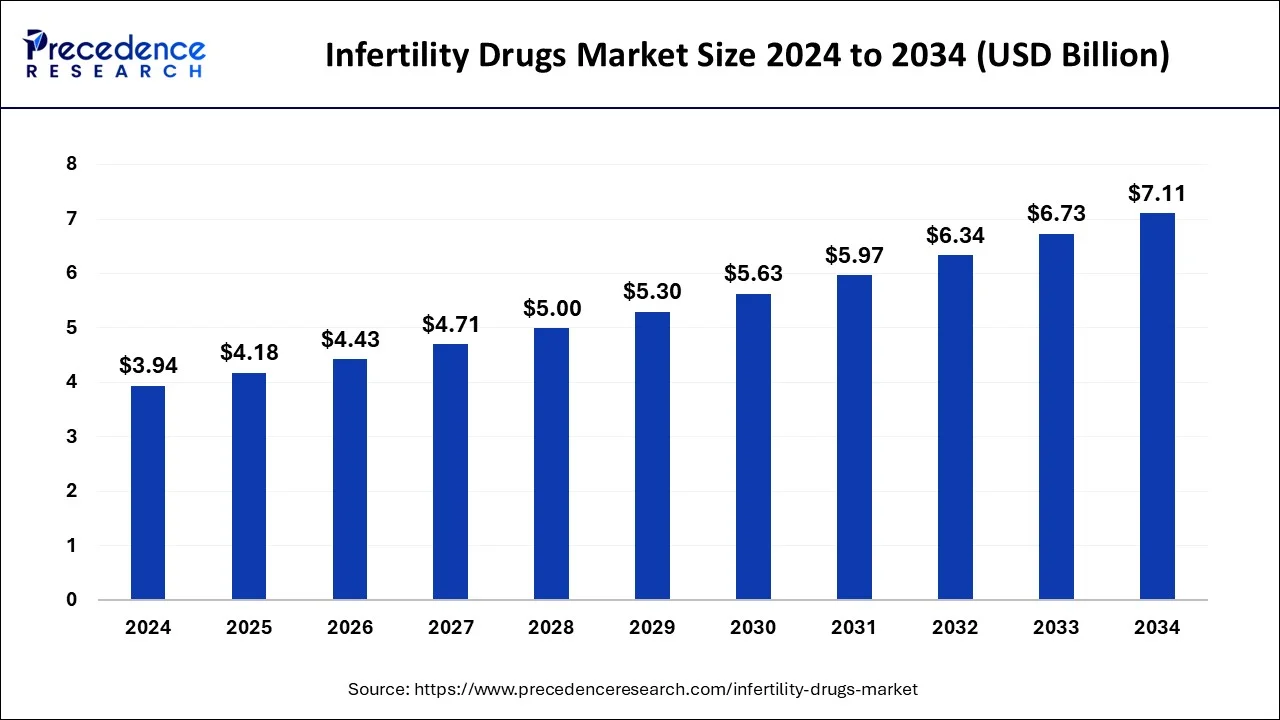The global infertility drugs market size was estimated at USD 3.71 billion in 2023 and is expected to reach around USD 6.73 billion by 2033, growing at a CAGR of 6.13% from 2024 to 2033.
Key Points
- The global infertility drugs market size accounted for USD 1.45 billion in 2023 and is expected to rise around USD 2.65 billion by 2033.
- North America dominated the market with the largest market share of 39% in 2023.
- Asia Pacific is expected to expand at the fastest CAGR of 6.93% during the forecast period.
- By drug class, the gonadotropins segment has contributed more than 41% of market share in 2023.
- By the drug class, the selective estrogen receptor modulators segment is predicted to show rapid growth in the market.
- By the distribution channel, the hospital pharmacy segment has generated more than 55% of market share in 2023.
- By distribution channel, the online pharmacy segment is expected to grow at a high rate over the forecast period.
- By end-user, the women segment has contributed more than 74% of market share in 2023.
- By end-user, the men segment will be the fastest-growing segment during the forecast period.

The global infertility drugs market is experiencing significant growth driven by increasing infertility rates worldwide and advancements in reproductive medicine. Infertility drugs are used to stimulate ovulation, regulate hormones, and treat underlying conditions contributing to infertility. Key market segments include ovulation induction drugs, hormonal treatments, and others aimed at addressing specific fertility issues. With rising awareness about fertility treatments and expanding healthcare infrastructure, the market shows promising expansion prospects.
Get a Sample: https://www.precedenceresearch.com/sample/4243
Growth Factors
The growth of the infertility drugs market is fueled by several factors. Firstly, changing lifestyle patterns leading to delayed pregnancies and rising stress levels contribute to infertility, boosting the demand for fertility treatments. Secondly, technological innovations such as personalized medicine and improved drug delivery systems are enhancing treatment outcomes and patient convenience. Moreover, supportive government initiatives and increasing investments in reproductive health services are driving market growth globally.
Region Insights
Regional dynamics play a crucial role in shaping the infertility drugs market. Developed regions like North America and Europe dominate the market due to higher healthcare expenditures and advanced fertility clinics. Asia-Pacific is witnessing rapid market growth owing to a large population base and increasing awareness about fertility treatments. In contrast, emerging economies in Latin America and Africa are experiencing gradual market expansion driven by improving healthcare infrastructure and rising disposable incomes.
Infertility Drugs Market Scope
| Report Coverage | Details |
| Growth Rate from 2024 to 2033 | CAGR of 6.13% |
| Global Market Size in 2023 | USD 3.71 Billion |
| Global Market Size in 2024 | USD 3.94 Billion |
| Global Market Size by 2033 | USD 6.73 Billion |
| Largest Market | North America |
| Base Year | 2023 |
| Forecast Period | 2024 to 2033 |
| Segments Covered | By Drug Class, By Distribution Channel, and By End-user |
| Regions Covered | North America, Europe, Asia-Pacific, Latin America, and Middle East & Africa |
Infertility Drugs Market Dynamics
Drivers
Key drivers influencing the infertility drugs market include the growing prevalence of conditions like polycystic ovary syndrome (PCOS) and endometriosis, which contribute to infertility in women. Additionally, increasing awareness about fertility preservation among cancer patients undergoing treatments that affect fertility is boosting demand for these drugs. Furthermore, changing societal norms and the acceptance of assisted reproductive technologies are driving market acceptance and adoption.
Opportunities
The infertility drugs market presents opportunities for innovation and expansion. Collaborations between pharmaceutical companies and fertility clinics can enhance treatment protocols and access to advanced therapies. Expanding into emerging markets with unmet healthcare needs and investing in research and development for novel infertility treatments are promising strategies for market players. Moreover, catering to the rising demand for male infertility treatments represents a significant growth opportunity.
Challenges
Despite the growth prospects, the infertility drugs market faces challenges. Regulatory complexities and varying reimbursement policies across different regions can hinder market entry and expansion. High treatment costs and limited insurance coverage pose affordability issues for patients, especially in developing countries. Moreover, ethical concerns and social stigmas associated with assisted reproductive technologies may affect market acceptance and adoption rates, presenting challenges for market players.
Read Also: Calcium Peroxide Market Size to Reach USD 3.38 Bn By 2033
Infertility Drugs Market Recent Developments
- In February 2024, Lupin, a major global pharma company, launched Ganirelix Acetate Injection. It is a single-dose prefilled syringe indicated for inhibiting premature luteinizing hormone (LH) surges in women who undergo ovarian hyperstimulation.
- In March 2024, Future Generali India Insurance launched ‘Health PowHER’, a product designed exclusively for women healthcare at various stages of their lives. There will be varios treatments offered by the product, and one of the treatments will be infertility treatment. This will include oocyte cryopreservation, stem cell storage, wellness programme, insurance for newborn defects, nursing care, and many more benefits.
Infertility Drugs Market Companies
- Merck & Co., Inc.
- Ferring B.V.
- Organon Group of Companies
- Abbott
- Novartis AG
- Bayer AG
- Pfizer Inc.
- Mankind Pharma
- Teva Pharmaceutical Industries LTD.
- Sanofi
Segments Covered in the Report
By Drug Class
- Gonadotropins
- Aromatase Inhibitors
- Selective Estrogen Receptor Modulators (SERMs)
- Dopamine Agonists
- Others
By Distribution Channel
- Hospital Pharmacy
- Specialty & Retail Pharmacy
- Online Pharmacy
By End-user
- Men
- Women
By Geography
- North America
- Asia Pacific
- Europe
- Latin America
- Middle East & Africa
Contact Us:
Mr. Alex
Sales Manager
Call: +1 9197 992 333
Email: sales@precedenceresearch.com
Web: https://www.precedenceresearch.com
Blog: https://www.uswebwire.com/
